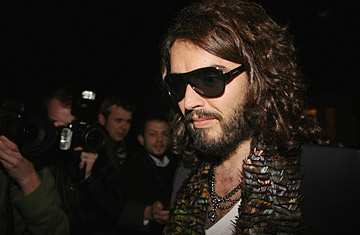
Russell Brand arrives outside his house following his resignation from his BBC radio programme on October 29, 2008 in London, England.
Maybe it's because Brits are so bad at articulating disapproval (think of the strangled harrumphs directed at "queue-jumpers") that they outsource their outrage to richly opinionated newspapers and rent-a-quote politicians. And the scale of opprobrium directed this week at Britain's public service broadcaster, the BBC, and two of its best-known stars by the full spectrum of newspapers and politicians from Prime Minister Gordon Brown downwards, suggests that Britons are very, very cross.
It all started with prank calls by comedian Russell Brand and chat-show host Jonathan Ross, broadcast on Brand's BBC radio show. In a series of voicemail messages to 78-year-old actor Andrew Sachs — fondly remembered as the much-abused waiter Manuel in John Cleese's classic 1975 sitcom series Fawlty Towers — the pranksters suggested that Brand had slept with Sachs's granddaughter. Then, in a pretend apology, they called back and left further messages, including an improvised ditty by Brand: "I'd like to apologize for these terrible attacks, Andrew Sachs. I'd like to show contrition to the max, Andrew Sachs. I'd like to create world peace, between the yellow, whites and blacks, Andrew Sachs, Andrew Sachs. I said some things I didn't of oughta, like I had sex with your granddaughter," he sang.
The negligible comedic value of the calls was further undermined by an unfortunate fact: Brand really had been briefly involved with Sachs's granddaughter, Georgina Baillie, a member of a dance troupe called the Satanic Sluts. Baillie quite rightly protested at this invasion of her privacy. Her decision to do so via the press provided newspapers with further occasion to print photographs of Baillie provocatively dressed as her stage alter-ego, Voluptua.
Many of the articles that accompanied these decorative images attacked BBC management for allowing the broadcast (the calls, after all, had been pre-recorded) and for presiding over Britain's supposed moral decline. THE BBC WAKES UP TO DECENCY declared the Daily Mail in its banner headline on Oct. 31, announcing the resignation of a senior BBC executive over the affair. Brand also quit his BBC show, and Ross, who presents a talkshow and a film review program for the broadcaster, has been suspended without pay for three months.
With a shared taste for suggestive and scatological humor, Brand and Ross irk critics of the BBC who say that the broadcaster should restrict itself to more high-minded fare to meet its public service mandate to inform and to entertain. The BBC argues that it needs to invest in such talents to fulfill the second half of that mandate. Yet as the government bails out banks and consumers batten down for a long, bleak recession, the BBC's public funding — via a license levy on all households with a TV set — is increasingly controversial, and the hefty salaries paid to Brand and especially Ross (reputedly on a three year contract worth 18 million) seem oddly out of step with the era.
That's also true of their humor, which is mostly politics-free (although Brand recently referred to President Bush as a "retard cowboy"). Tough times often inspire sharper and more subversive comedy. But in the wake of this latest kerfuffle, a chastened BBC will be wary of taking risks on emerging talents. Ironically, this could lead to a greater dependence on established names. "The result of this lamentable affair could well be to gag a generation of comic talent and stifle spontaneity and cutting-edge humor," e-mails Lise Mayer, co-writer of the 1980s sitcom The Young Ones, widely acknowledged by less partial sources (full disclosure: she's my sister) as ground-breaking. It also provoked a few strangulated harrumphs when it was first shown. Not everything that shocks is funny, as Brand and Ross's prank calls prove, but rules of comedy dictated by the tabloids? That would be no laughing matter.
